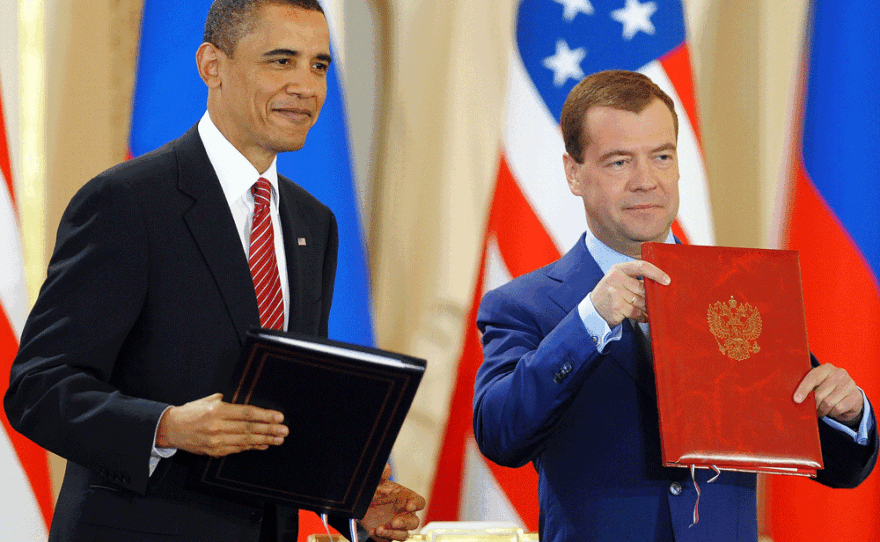President Obama and Russian President Dmitry Medvedev signed a significant new arms-control deal Thursday that requires both countries to cut their strategic nuclear arsenals by about one-third.
The treaty-signing in Prague comes almost exactly a year after Obama spelled out his long-range goal of a world without nuclear weapons. The agreement marks a step in that direction.
The two leaders had hoped to have it signed by last December, when the old START treaty expired. There were fits and starts before a final telephone call sealed the deal two weeks ago. Secretary of State Hillary Clinton said that in the end, patient diplomacy produced a treaty with real results.
"It says to our country, the Cold War really is behind us, and these massive nuclear arsenals that both our countries maintained as part of deterrence no longer have to be so big," Clinton said. "We can begin to cut that."
The agreement calls for the United States and Russia to cut their long-range nuclear arsenals by about 30 percent over the next seven years. Clinton says the treaty also follows the old Russian proverb often invoked by President Reagan: Trust but verify.
Nuclear parity is particularly important to Russia, which lags the U.S. in conventional weapons. And keeping an eye on Russia is important to the U.S., says Andrew Kuchins, a senior fellow at the Center for Strategic and International Studies.
"With the expiration of the START I treaty in December, it meant you were going to lose the entire verification and monitoring regime that went along with that," he said. "So I think for the Obama folks, being able to replace the treaty and maintain a significant degree of that verification and monitoring regime is probably the most important achievement, from the standpoint of U.S. national security, with the treaty."
A Lesson To Others
The U.S. and Russia still hold the vast majority of the world's nuclear weapons. Clinton says cutting those stockpiles makes it easier for the former Cold War adversaries to encourage other countries to resist a nuclear buildup.
"The treaty also shows the world — particularly states like Iran and North Korea — that one of our top priorities is to strengthen the global nonproliferation regime and keep nuclear materials out of the wrong hands," Clinton said.
Next week, leaders of more than 40 countries gather in Washington for a summit meeting on safeguarding nuclear material. Next month, there's a meeting in New York on strengthening the 40-year-old Nuclear Non-Proliferation Treaty.
Arms control expert Steven Pifer of the Brookings Institution says the Obama administration was anxious to have this deal with the Russians signed before those talks.
"It allows the American delegation at that review conference to say the United States is doing its part — it's cutting nuclear weapons," Pifer said. "And now the review conference needs to find ways to make it more difficult for other countries to get nuclear weapons."
An Improvement In Relations
The deal also underscores the improvement in U.S.-Russia relations, which had been at a low point when President Obama took office. Pifer says historically, progress on arms control has led to advances in other areas with the Russians. Moscow has already given the U.S. military access to its airspace for flying lethal equipment into Afghanistan. Pifer says Russia is slowly moving closer to the U.S. position in favor of sanctioning Iran over its nuclear program.
"I suspect in the end Russia is not going to go as far as Washington might like in terms of talking about and actually moving toward sanctions on Iran," he said. "But certainly they're talking about steps now that they weren't talking about a year ago. And that's good news."
For all the hoopla over Thursday's signing, the arms-control treaty still has to be ratified by two-thirds of the U.S. Senate, as well as Russia's Duma. The Obama administration has been consulting lawmakers from both parties. Officials say they hope the treaty will win broad, bipartisan support.
Copyright 2022 NPR. To see more, visit https://www.npr.org. 9(MDAzMjM2NDYzMDEyMzc1Njk5NjAxNzY3OQ001))







